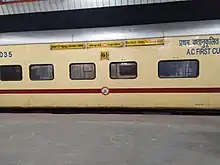| Integral Coach Factory (ICF) coach | |
|---|---|
 Yellow ("Utkrisht" livery) and blue ("Blue" livery) ICF coaches. | |
| Designer | Swiss Car & Elevator Manufacturing Co |
| Built at | |
| Constructed | 1955–2018 |
| Scrapped | c.2000s–2009 (PNR) |
| Number scrapped | 30 (PNR) |
| Successor |
|
| Operators |
|
| Specifications | |
| Car body construction | Corten Steel |
| Car length | 22,297 millimetres (22.297 m) including buffers |
| Width | 3,245 millimetres (3.245 m) |
| Height | 4,025 millimetres (4.025 m) |
| Floor height | 1,313 millimetres (1.313 m) |
| Wheelbase | 14,783 millimetres (14.783 m) |
| Maximum speed | 130 km/h (81 mph) |
| Bogies | ICF Bogies |
| Minimum turning radius | 152.4 m |
| Coupling system | Buffers and chain coupler, AAR H Type Tightlock CBC coupling |
| Track gauge | 1,676 mm (5 ft 6 in) |
The Integral Coach Factory (ICF) coach is a conventional passenger coach used on the majority of Indian Railways (IR) lines.[1] The Philippine National Railways (PNR) was a previous user of the cars, but retired the last of them in 2009.[1]
Indian Railways is currently phasing out ICF coaches and replacing them with newer LHB coaches are expected to address many of these issues.[1][2][3]
History
The design of the coach was developed by Integral Coach Factory, Perambur, Chennai, India in collaboration with the Swiss Car & Elevator Manufacturing Co, Schlieren, Switzerland in the 1950s. The design is also called the Schlieren design based on the location of the Swiss company.
Project Utkrisht

In April 2008 the Indian Railways launched a refurbishment program called Utkrisht (transl. excellence) to refurbish and modernize ICF coaches in 640 rakes.[4]
With a total cost of ₹400 crore (US$90 million), the refurbishment included a new beige and maroon livery, LED fixtures, upgraded bio-toilets with odour control, assistive Braille signage, and improved trash disposal.[5]
Retirement and Legacy
The last ICF coach was flagged off on 19 January 2018 by senior technician P. Bhaskar in the presence of Railway Board chairman Ashwani Lohani.[3] Indian Railways plans to retire all ICF coaches by 2029, replacing them with LHB and Vande Bharat trainsets.[6]
Central Railways is converting ICF coaches having a residual life of 5 years into accident relief and New Modified Goods-High Speed (NMGH) automobile carrier rakes. As of September 2023, 57 ICF coaches have been converted into NMGH rakes and 4 ICF coaches have been converted into accident relief trains.[7]
Liveries
Standard
Since their introduction in 1955 with a brick red livery, the ICF coaches were repainted blue in the 1990s, and in beige and red since 2008.[8]



Special
All of India's premier trainsets - the Rajdhani, Shatabdi and Duronto - and Garib Rath were introduced with ICF rakes. Garib Rath is the only trainset that continues to use ICF coaches to date, while the rest have been moved to LHB coaches.




Image gallery
 A red ICF coach used on an unnamed train
A red ICF coach used on an unnamed train A blue ICF coach used on the Gorakdham Express
A blue ICF coach used on the Gorakdham Express A buffers and chain coupler on an ICF coach used on Uttaranchal Sampark Kranti Express
A buffers and chain coupler on an ICF coach used on Uttaranchal Sampark Kranti Express
See also
- Bo-Bo – The wheel arrangement of ICF coaches as per the UIC classification
References
- 1 2 3 "DNA Exclusive: Is It Time for Indian Railways to Tear Up Ageing Tracks and Old Machinery?". ZeeNews.India.com. Zee Media Corporation. 14 January 2022. Retrieved 6 June 2023.
- ↑ Ayyappan, V. (4 January 2021). "Leakage Found in ICF Coaches". The Times of India. Retrieved 6 June 2023.
- 1 2 Debroy, Bibek (9 February 2018). "A 70-Year-Old Vs a 30-Year-Old: LHB Coaches Perform Better than ICF Ones". Business Standard. Retrieved 6 June 2023.
- ↑ "Introduction of New Trains". Press Information Bureau. Press Information Bureau. Retrieved 8 January 2024.
- ↑ "Project Utkrisht: Indian Railways gives mail/express trains swanky revamp". The Economic Times. 4 October 2018. Retrieved 8 January 2024.
- ↑ Mishra, Twesh (19 July 2023). "Railways to have only LHB and Vande Bharat coaches in next 6 years: Official". The Economic Times. ET Bureau. Retrieved 8 January 2024.
- ↑ "Central Railway converts ageing ICF coaches into accident relief trains". The Indian Express. Express News Service. 20 October 2023. Retrieved 8 January 2024.
- ↑ "The dying sight of uniform liveries on Indian trains". A Little Voice. 12 April 2022. Retrieved 8 January 2024.